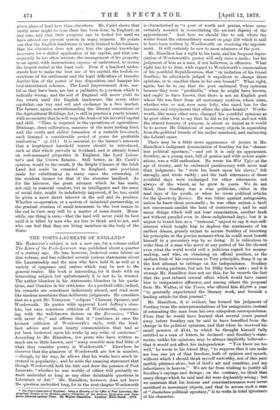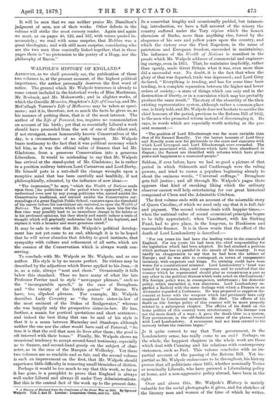TUE POETS-LAUREATE OF ENGLAND.*
Ma. HAMILTON'S subject is not a new one, for a volume called The Lives of the Poets-Laureate was published about a quarter of a century ago. He has, however, bestowed some labour on this volume, and has collected. several curious statements about the Laureateship and the men who have held it, as well as a variety of epigrams and satires which may be new to the general reader. His book is interesting, for it deals with an interesting subject, but unfortunately it is not to be trusted. The author blunders in his statements, blunders in his quota- tions, and blunders in his criticisms. As a poetical critic, indeed, his remarks are sometimes ludicrously absurd, and read more like random assertions than deliberate judgments. He considers that as a poet Mr. Tennyson " eclipses " Chaucer, Spenser, and Wordsworth. He quotes with approval Lord Jeffrey's obso- lete, but once notorious criticism of Wordsworth, commenc- ing with the well-known dictum on the Excursion, "This will never do ;" and. affirms that it "combines at once the keenest criticism of Wordsworth's style, with the kind- liest advice and most hearty commendation that had as yet been bestowed upon his works by any critic of eminence." According to Mr. Hamilton, few poets who have written so much are so little known, and "many sensible men find little of what they consider poetry in Wordsworth." Elsewhere he observes that the admirers of Wordsworth are few in number, —though, by the way, he allows that his works have much in- creased in popularity ; and he adds the amazing statement that though Wordsworth held the title and drew the pension of Poet Laureate, "whether he was worthy of either will probably re- main undecided as long as any other debateable questions in Literature or Art." Mr. Hamilton, however, does not leave the question undecided long, for in the next chapter Wordsworth • The Poets-Laureate of Au:Nand: being a History of the Office of Poet Laureate, Bio- graphical Notices of its Holders, and a Collection of the Satires, Epigrams, and Lam- poons Directed against Them. By Walter Hamilton London: Eliot Stock. 1878.
is characterised as "a poet of worth and genius, whose name certainly assisted in resuscitating the ancient dignity of the appointment." And here we should like to ask where the writer found the extraordinary sonnet on page 258 which is said to have been written by Wordsworth on receiving the appoint- ment. It will certainly be new to most admirers of the poet.
Mr. Hamilton has a right to his taste, and his frequent depre- ciation of Wordsworth's poetry will only raise a smile ; but his judgment of him as a man, if not ludicrous, is offensive. What right has he to hint, with regard to Wordsworth's renunciation of his youthful Republicanism, that "in imitation of his friend Southey, he afterwards judged it expedient to change these opinions, or to smother them in his own breast?" What right, again, has he to say that the poet embraced Tory opiniona because they were "profitable," when he might have known, and ought to have known, that there is not an English poet whose life was freer from all mercenary motives, whose aims, whether wise or not, were more lofty, who cared less for the luxuries and enjoyments that allure the place-hunter? Words- worth, like many other men, changed his youthful opinions as he grew older ; but to say that he did so for lucre, and not with the utmost honesty of purpose, is about as unjust as it would be to accuse Mr. Gladstone of mercenary objects in separating from the political friends of his earlier manhood, and embracing- the Liberal cause.
There may be a little more appearance of justice in M.T. Hamilton's indignant denunciation of Southey for his "shame. less political apostasy,"—and yet it is only an appearance.. Southey, as a young man, full of genius and with ardent aspir- ations, was a wild enthusiast. He wrote his lrfrat Tyler at the age of twenty, and he embraced pantisocracy with more Bead than judgment ; he "wore his heart upon his sleeve," felt strongly, and wrote rashly ; and the rash utterances of those youthful days were exchanged for other utterances, not always of the wisest, as he grew in years. We do nOt think that Southey was a wise politician, either in the mad days of his youth, or when he wrote political articles for the Quarterly Review. He was bitter against antagonists, unless he knew them personally ; he was often unjust, a fault not uncommon amidst the heat of controversy ; and he said many things which will not bear examination, another fault not without parallel even in these enlightened days ; but it is unjust to brand him as a "turncoat," unjust to say it was self- interest which taught him to deplore the sentiments of his earliest drama, grossly unjust to accuse Southey of deserting- his principles at the precise moment when he could most benefit himself in a pecuniary way by so doing. It is ridiculous to. write thus of a man who never at any period of his life showed even what the world would call a judicious regard for money- making, and who, on obtaining an official position, as the earliest fruit of his conversion to Tory principles, flung it up at the first attempt to infringe on his independence. Southey was a strong partisan, but not for filthy lucre's sake ; and it is strange Mr. Hamilton does not see this, for he records the fact that the poet refused several offers which would have raised him to comparative affluence, and among others the proposal from Mr. Walter, of the Times, who offered him £2,000 a year "to generally superintend the literary work, and furnish a leading article for that journaL" Mr. Hamilton, it is evident, has formed his judgment of Southey from the misrepresentations of his antagonists, instead of estimating the man from his own outspoken correspondence. From that he would have learned that several years passed_ away before Southey can be said to have benefited from the change in his political opinions, and that when he received his small pension of 2144, to which he thought himself fully entitled as a man of letters, he declared—and Southey's state- ments, unlike his opinions, may be always implicitly believed— that it would not affect his independence. "You know me too well," he wrote to his friend May, "to suppose that it can make me lose one jot of that freedom, both of opinion and speech,. without which I should think myself unworthy, not of this poor earthly pittance alone, but of God's air and sunshine, and my inheritance in heaven." We are far from wishing to justify all Southey's sayings and doings ; on the contrary, we think that many things which he said and did were deplorably wrong ; but we maintain that his honour and conscientiousness were never sacrificed to mercenary objects, and that to accuse such a man of "shameless political apostasy," is to write in total ignorance of his character.
It will be seen that we can neither praise Mr. Namilton's judgment of men, nor of their works. Other defects in the volume will strike the most cursory reader. Again and again we meet, as on pages 40, 126, and 167, with verses quoted in- accurately; we read with some surprise, that Hobbes was a great theologian; and with still more surprise, considering who are the two men thus comically linked together, that in these pages there is "no pretension to the poetry of a Hogg, nor the philosophy of Bacon."



































 Previous page
Previous page